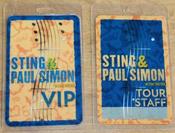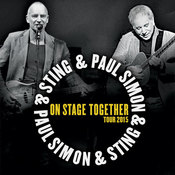
Paul Simon & Sting...
Sting flirts the hardest. But Paul Simon brings out the greatest musical joy.
What do Sting (63) and the ten-year-old Paul Simon have in common?
A few things, at least: A "professorial" approach to the craft of songwriting. A knack for picking musicians from the absolute top shelf. A certain lack of warmth in their aura.
And then they are neighbours in New York.
But important things also separate them. The ten years, as mentioned, which means that Simon is from the sixties and Sting from the seventies.
Sting is Newcastle's Adonis - still a sinewy sight in black "slimfit" trousers and a tight, tight T-shirt. He exudes self-confidence, right on the verge of unbearable self-indulgence (over the border, many would argue, when he commits his hip dance in "Desert Rose").
Simon is two heads smaller, and awkward by nature. Nobody cares what he's wearing (for the record: jeans, shirt). He's nerdy, neurotic.
Both are "thinkers". But Simon thinks the deepest, and is clearly the more angsty of the two.
So it may seem paradoxical that it's Simon's songs that make you happiest and most happy. But that's how it is.
For a while it looks as if Sting is going to crush his short buddy. The Brit tours the big, big band – I count 15 men at most, but he may have gotten away with it – with cadre discipline. Simon's magnificent "The Boy In The Bubble" disappears into chaos and chaos, and too many musicians who can't find a unified "groove".
They start together – Sting bows to the master, Simon makes do with a handshake – and then start with separate sets.
Paul jokes about this about duos: "They don't end well". He is of course referring to Art Garfunkel, to whom he was "married" in the old days, and whom he can't stand. Just as Sting can't stand the sight of his old drummer from The Police, Stewart Copeland.
Speaking of Copeland. Sting, who is taking the first solo round of the arena, has a new drummer who is extremely good at imitating his cymbal-screaming, tom-tom-heavy drumming. Sting himself is an underrated electric bassist. He also has a violinist, who at times makes his group sound like a fusion band, like the Mahavishnu Orchestra.
Both the Police and solo songs get jazz-funk breaks a la his "Bring On The Night" period, and everyone – even him on tuba – gets a chance to play solos.
Simon takes over with "Mrs. Robinson," which again sounds rattling and rhythmically unclear. Paul Simon is not supposed to sound rattling. Fortunately, everything straightens out as the immortal drum riff of "50 Ways To Leave Your Lover" makes itself felt, and the joyful trend continues in "Dazzling Blue" and a triumphant "Graceland."
"Still Crazy After All These Years" reminds us that Sting may write hits - sometimes huge hits - but that Paul Simon writes standards. The saxophone solo is elegant, majestic. "Me And Julio Down By The Schoolyard" is so grinningly great that you sense a downturn when Sting returns to the stage.
They do the pompous "Fragile" together, before Sting puts one leg on a monitor and sings Simon's "America" - without the help of Paul Simon himself. His acoustic guitar is small, and the neck is high - it looks like he's playing a lute.
It's a nice, muscular set, with "The Hounds Of Winter" being the surprising highlight. His female vocalist sings extremely dramatically. He plays both "Message In A Bottle" and "Roxanne".
They meet again in "The Boxer", before Simon dances a little Cajun jig in "That Was Your Mother". High Los Lobos factor. "The Cool Cool River", with its nervously snapping electric guitars, is shockingly great. Likewise "Diamonds On The Soles Of Her Shoes". What a brilliant brass arrangement.
It ends with a brilliant drum and percussion break, which leads straight into "You Can Call Me All". The whole hall stands up. Musical bliss.
Simon calms down with the title track from his most underrated album, "Hearts And Bones" (1983), and of course we get both "Every Breath You Take" and "Bridge Over Troubled Water" and The Everly Brothers' "When Will I Be Loved" on the eve.
But the best has already happened. It happened when the little, troubled guy from New York crossed paths with his inner African.
Paul Simon's songs will live the longest. But he wasn't as bad as Sting either, I mean.
(c) VG by Morten Ståle Nilsen




